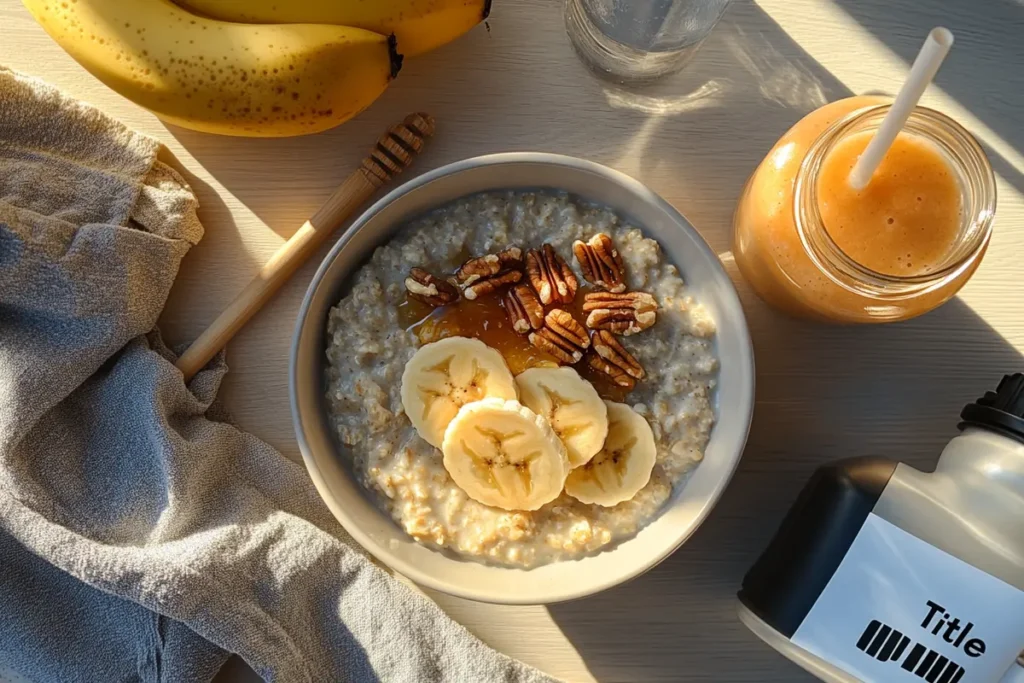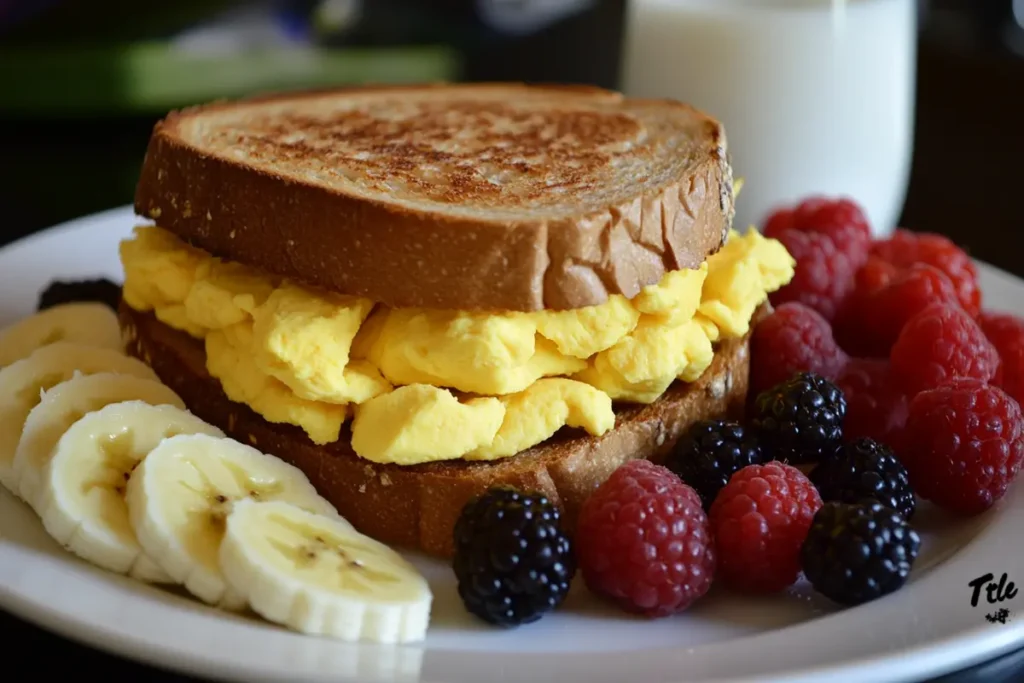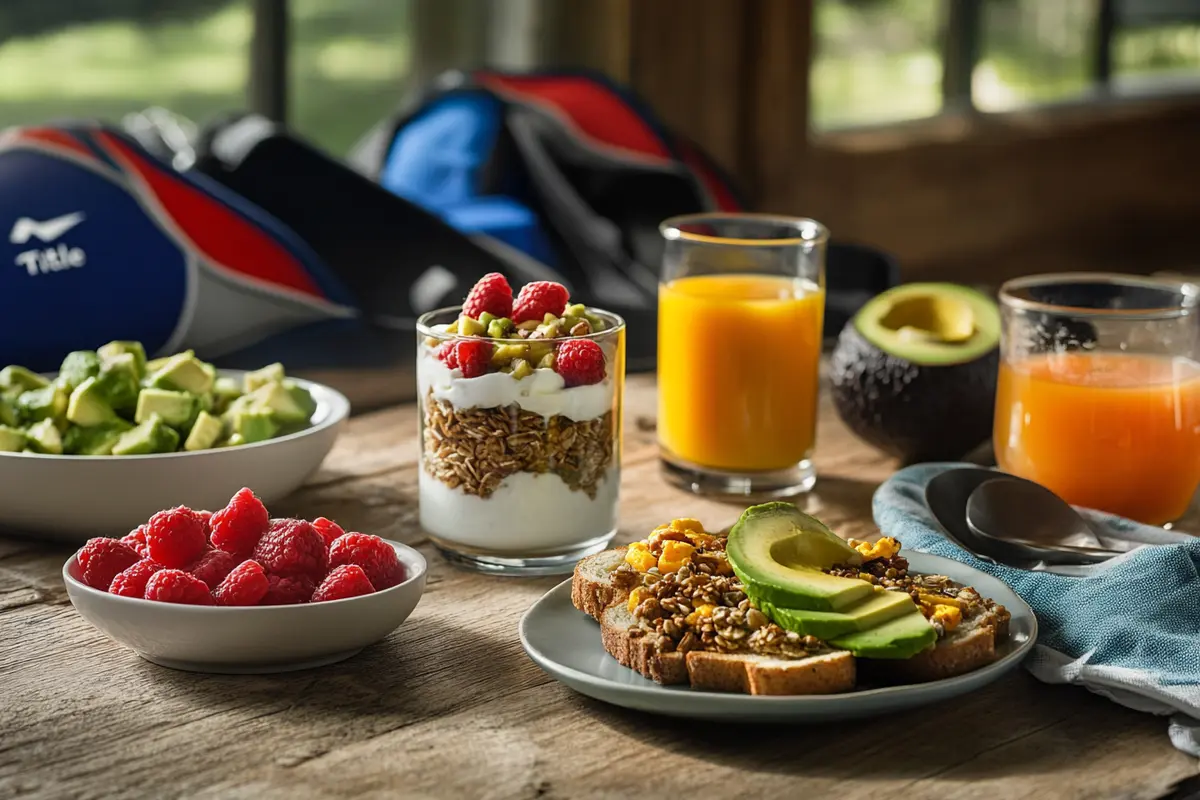Planning Ahead for a Healthy Breakfast for Teen Athletes
Teen athletes have unique nutritional needs. With busy schedules packed with school, practices, and games, eating a healthy breakfast can set the tone for their performance and recovery. This article dives deep into why breakfast is critical, what makes a balanced meal, and quick, practical ideas to fuel their day. Whether it’s preparing for a big game or just staying energetic, we’ve got you covered. Let’s explore how a healthy breakfast for teen athletes can make all the difference!
Part 1: Why Healthy Breakfast for Teen Athletes
The Importance of Breakfast in Supporting Athletic Performance
Breakfast isn’t just the first meal of the day—it’s the fuel that kick-starts the body and mind. For teen athletes, this meal provides essential energy to tackle both academics and sports. Without it, they may feel sluggish or find it harder to concentrate. Studies show that skipping breakfast leads to reduced endurance and lower energy levels, which can hinder athletic performance.
Key Nutritional Needs of Teen Healthy Breakfast for Teen Athletes
Teen athletes burn more calories and need more nutrients than their non-athletic peers. Their bodies require:
- Proteins for muscle repair and growth.
- Carbohydrates for a quick and sustained energy boost.
- Healthy fats to support overall health and endurance.
- Vitamins and minerals to maintain optimal bodily functions.
Skipping breakfast or eating a low-nutrient meal can deprive them of these essentials, setting them back both on the field and in the classroom.
Impact of Skipping Breakfast on Physical and Mental Performance
What happens when breakfast is missed? Beyond hunger pangs, teen athletes might experience reduced stamina, slower reaction times, and poor decision-making skills. Mentally, skipping breakfast can lead to irritability and difficulty focusing. Over time, consistently missing meals may contribute to nutrient deficiencies and diminished performance.
Breakfast is the game-changer—literally. Starting the day with a healthy breakfast for teen athletes builds a foundation for success, both physically and mentally.
Components of a Balanced Healthy Breakfast for Teen Athletes
Protein-Packed Foods for Muscle Recovery and Growth
Protein is a cornerstone of a healthy breakfast for teen athletes. It helps repair and build muscle after strenuous workouts and long practices. Foods like eggs, Greek yogurt, and lean meats are excellent choices. For plant-based athletes, tofu, nuts, and legumes provide great alternatives. Incorporating these into your breakfast ensures your body starts the day ready to tackle any physical demands.
For a unique twist, try recipes like Denver Omelet Hashbrown Casserole—a protein-packed dish ideal for young athletes seeking variety.
The Role of Healthy Carbohydrates for Sustained Energy
Carbs are the body’s main energy source, especially for athletes. Starting the day with whole-grain bread, oatmeal, or quinoa provides a steady release of energy. Avoid refined carbs, like sugary cereals, which can cause energy crashes later in the day.
Pairing carbs with protein creates a balanced meal that fuels workouts and enhances performance. A favorite combo is oatmeal topped with nut butter and fresh fruit.
Importance of Healthy Fats in a Balanced Diet
Don’t skip the fats! Healthy fats like those in avocados, nuts, and seeds support long-term energy and overall health. These fats also aid in the absorption of essential vitamins. A slice of whole-grain toast with avocado and a sprinkle of chia seeds is a quick and nutritious choice.
Adding Fiber and Micronutrients with Fruits and Vegetables
Adding fruits and vegetables to breakfast boosts fiber intake and provides a rich source of vitamins and minerals. Berries, bananas, spinach, and sweet peppers are easy to incorporate into smoothies, omelets, or parfaits.
Incorporating colorful produce into meals doesn’t just improve nutrition—it also enhances flavor and visual appeal, making breakfast a treat rather than a chore.
Quick and Easy Ideas for a Healthy Breakfast for Teen Athletes
Grab-and-Go Options for Busy Mornings

Teen athletes often juggle tight schedules, making quick breakfasts essential. Options like hard-boiled eggs with a piece of fruit, or a whole-grain English muffin with peanut butter, are nutritious and portable.
For more ideas, you might explore sweet breakfast recipes that are easy to prepare and still wholesome.
High-Protein Breakfast Recipes
Protein is key for recovery and energy. Recipes like an egg power omelet, a smoked salmon sandwich, or protein-packed oatmeal with almond butter are delicious and sustaining. Teen athletes can also try making a simple protein smoothie using Greek yogurt, milk, and fresh berries.
Energy-Boosting Smoothies
Smoothies are perfect for athletes who prefer a lighter meal in the morning. Blend spinach, frozen mango, banana, and protein powder for a nutrient-packed drink. Another option is a berry cheesecake smoothie using Greek yogurt and almond milk.
Prepping Ahead: Meal Prep Ideas for the Week
To save time, preparing meals in advance is a game-changer. Bake egg muffins loaded with veggies, or prepare overnight oats with chia seeds and fresh fruit. Having prepped meals ensures you never skip a healthy breakfast for teen athletes—even on the busiest days.
Gameday Breakfast Strategies for Teen Athletes
What to Eat Before a Game or Practice
Preparing for a game starts with the right fuel. A healthy breakfast for teen athletes on gameday should include easy-to-digest carbs and a small amount of protein. For example, a banana with a dollop of peanut butter or a slice of whole-grain toast with scrambled eggs works wonders.
Avoid greasy or heavy meals, as they may cause discomfort during intense physical activity. Instead, focus on light and balanced options that deliver energy without weighing you down.
Timing Your Breakfast for Optimal Performance
Timing is just as crucial as what you eat. Ideally, breakfast should be consumed 2-3 hours before the game to allow for digestion and energy absorption. For athletes with early morning games, a small pre-game snack like a fruit smoothie or energy bar 30 minutes before activity can help.
Hydration Tips to Complement Breakfast
Staying hydrated is non-negotiable. Start your day with a glass of water or an electrolyte-rich drink alongside breakfast. Continue sipping water throughout the morning to maintain optimal hydration levels. Proper hydration not only supports endurance but also enhances focus and coordination on the field.
Common Mistakes to Avoid in Breakfast Planning
Overloading on Sugars and Refined Carbs

It might be tempting to grab sugary cereals or pastries, but these provide quick energy spikes followed by a crash. Teen athletes should opt for whole-grain alternatives to keep energy levels steady. For example, swap sugary granola for a homemade version with nuts and dried fruit.
Ignoring Protein Needs
Skipping protein in the morning is a missed opportunity. Protein is essential for muscle repair and sustained energy. Incorporate high-protein foods like eggs, yogurt, or lean meats into breakfast to avoid mid-morning hunger pangs.
Skipping Breakfast Altogether
The worst mistake of all? Skipping breakfast. Without it, athletes risk fatigue, slower reaction times, and reduced endurance. Preparing meals in advance, such as egg muffins or overnight oats, can make it easier to prioritize a healthy breakfast for teen athletes, even on hectic mornings.
Relevant Suggestions
For more inspiring breakfast ideas, explore this helpful recipe collection: Chicken Breakfast Recipes. It’s packed with versatile options that are perfect for athletes.
FAQs on Healthy Breakfast for Teen Athletes
What Is the Healthiest Breakfast for Athletes?
The healthiest breakfast for athletes combines protein, healthy fats, and whole-grain carbs. For teen athletes, meals like scrambled eggs paired with whole-grain toast and avocado or oatmeal topped with almond butter and fresh berries work exceptionally well. Not only do these meals provide sustained energy, but they also deliver the vital nutrients needed to power through intense workouts and demanding schedules.
Moreover, adding fruits or vegetables boosts the fiber and vitamin content, ensuring a balanced start to the day.
Do Elite Athletes Eat Breakfast?
Absolutely, elite athletes prioritize breakfast to fuel their bodies and enhance performance. In fact, breakfast is essential for replenishing glycogen stores that deplete during sleep. Additionally, it jumpstarts metabolism and prepares the body for the physical challenges ahead.
Teen athletes can take a cue from the pros by consistently opting for nutrient-rich, balanced meals. This habit not only supports athletic performance but also helps them stay focused in class.
What Is the Best Breakfast to Have Before Sport?
A pre-sport breakfast should be light, easily digestible, and balanced with carbs and protein. For example, Greek yogurt mixed with granola and fruit is an excellent option, or you can try a smoothie made with spinach, banana, and protein powder.
Timing is equally important. Ideally, athletes should eat 2-3 hours before activity to allow for proper digestion and maximum energy release. For those in a rush, a quick snack like a banana and nut butter 30 minutes before a game works well to maintain stamina.
What Do D1 Athletes Eat for Breakfast?
Division 1 athletes often consume high-calorie, nutrient-dense breakfasts to meet their rigorous energy needs. Popular options include omelets filled with vegetables, whole-grain pancakes topped with fresh fruit, or protein-packed oatmeal.
Teen athletes can adapt similar strategies by focusing on variety and balance in their meals. Over time, these practices can significantly enhance their endurance, strength, and recovery.
Related Recipes and Final Thoughts
Explore Related Recipes for Teen Athletes
Looking to try something new? Check out Pumpkin Banana Loaf for a wholesome, energy-packed breakfast treat. This recipe combines the natural sweetness of bananas with the heartiness of pumpkin, making it perfect for busy mornings.
For more ideas, browse through Sweet Breakfast Recipes to discover delicious and nutritious options tailored for active lifestyles.
Final Thoughts
A healthy breakfast for teen athletes is more than just a meal; it’s a tool for success. By focusing on balanced, nutrient-rich foods, young athletes can improve their performance, recovery, and overall well-being. With a little planning and creativity, breakfast can become the most powerful part of their day.
Would you like further customization or additional sections?
Benefits of a Nutritious Breakfast for Young Athletes
Improved Athletic Performance
Eating a healthy breakfast for teen athletes provides the energy needed to excel in sports. Meals rich in complex carbohydrates, protein, and healthy fats fuel endurance and strength, allowing athletes to perform at their best during games and practices. For example, whole-grain oatmeal topped with nuts and fresh fruit delivers sustained energy throughout the day.
Skipping breakfast can lead to fatigue, slower reaction times, and poor concentration, all of which hinder performance on and off the field. A balanced meal ensures athletes start their day on the right foot.
Enhanced Recovery and Growth
Teen athletes experience rapid growth and intense physical exertion. Breakfast plays a critical role in muscle repair and recovery. Including protein-rich foods like eggs or Greek yogurt helps repair muscles after rigorous workouts, while vitamins and minerals from fruits and vegetables support overall health.
A nutrient-dense breakfast also prevents muscle breakdown by replenishing glycogen stores depleted overnight. This not only aids recovery but also helps in building stronger, healthier muscles.
Tips for Making Breakfast a Daily Habit
Planning Ahead for Success
Consistency is undoubtedly key to reaping the many benefits of a healthy breakfast for teen athletes. By planning meals in advance, mornings can become stress-free and efficient. For instance, preparing overnight oats, assembling smoothie bags, or baking egg muffins ensures quick and easy options are always available.
Additionally, meal prep reduces the likelihood of skipping breakfast, even on the busiest of days. With just a bit of preparation, it becomes incredibly easy to enjoy a nutritious start to the day without sacrificing valuable time.
Involving Teens in the Process
Moreover, engaging teens in the breakfast-making process is a fantastic way to encourage them to take ownership of their health. For example, allowing them to choose ingredients, experiment with new recipes, or even prepare their meals fosters independence and creativity.
Not only does this approach build lifelong healthy habits, but it also makes breakfast more enjoyable and something they look forward to. As a result, they’re more likely to stick with these routines and develop a positive relationship with nutritious eating.
For inspiration, check out the recipe for Pumpkin Banana Loaf, a flavorful option that teens can bake ahead for the week.
Setting a Routine
Building a morning routine that prioritizes breakfast is crucial. Encourage athletes to wake up a few minutes earlier or organize their evening schedule to ensure they have time for a proper meal. Over time, this routine becomes second nature, supporting both their health and performance.
Nutritional Content of a Healthy Breakfast for Teen Athletes (Per 100g)
Here’s an estimated nutritional breakdown of a balanced breakfast suitable for teen athletes, focusing on protein, energy, and overall nutrition:
| Nutrient | Amount (Per 100g) | % Daily Value* |
|---|---|---|
| Calories | 185 kcal | 9% |
| Protein | 10 g | 20% |
| Total Fat | 6 g | 8% |
| Saturated Fat | 1.5 g | 8% |
| Carbohydrates | 24 g | 8% |
| Fiber | 3 g | 12% |
| Sugars | 5 g | — |
| Sodium | 200 mg | 8% |
| Calcium | 80 mg | 6% |
| Iron | 1.8 mg | 10% |
| Vitamin D | 1.2 mcg | 6% |
Notes:
- Nutritional values are approximate and will vary depending on ingredients and portion sizes.
- Percent Daily Values are based on a 2,000-calorie diet. Individual requirements may differ based on age, activity level, and specific needs.
This table provides a clear, reader-friendly view of the nutritional value of a breakfast tailored for teen athletes. Let me know if you’d like additional tweaks or another format!

